Home >Common Problem >How to use ClipChamp: the free Windows 11 video editor
Remember Windows Movie Maker on Windows 7? Since discontinuing Windows Movie Maker, Microsoft hasn't launched any real movie makers. On the other hand, they tried to revamp the Photos app with a small and lightweight built-in video editor. After a long time, Microsoft launched Clipchamp, a better video processor for all Windows 11 devices. In this article, we’ll take a deep dive into how to get everything from the Clipchamp app on your Windows 11 device.
We provide detailed tutorials on how to use Clipchamp to manage your videos using different tools, stock audio video clips, text to speech generator and more.
You must log in to Clipchamp before you can do anything else.
1. Press the Windows key and click on the " Clipchamp " application.
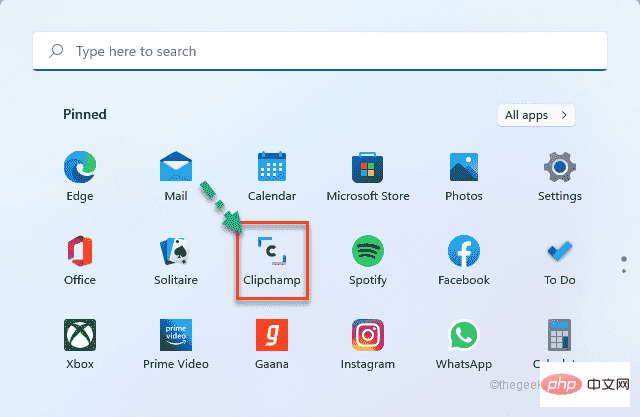
2. In the Clipchamp app, click " Continue with Microsoft ".
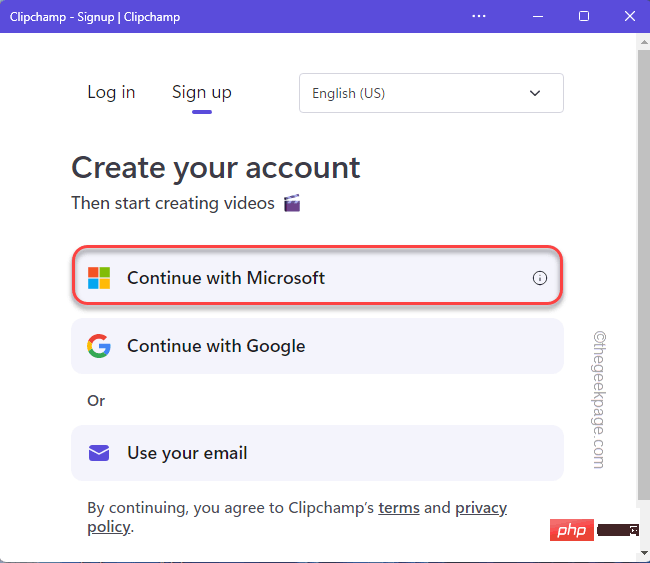
#3. This will automatically detect your Microsoft ID and sign you in.
4. Just click "is" to enable Clipchamp.
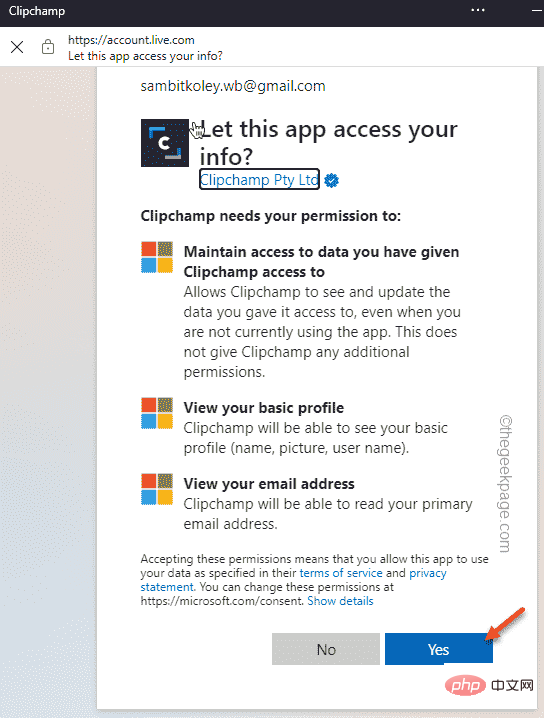
#5. Now, you will be asked 'What kind of video brought you to Clipchamp? '.
6. Click "Personal". Otherwise, you can choose anything else from the options.
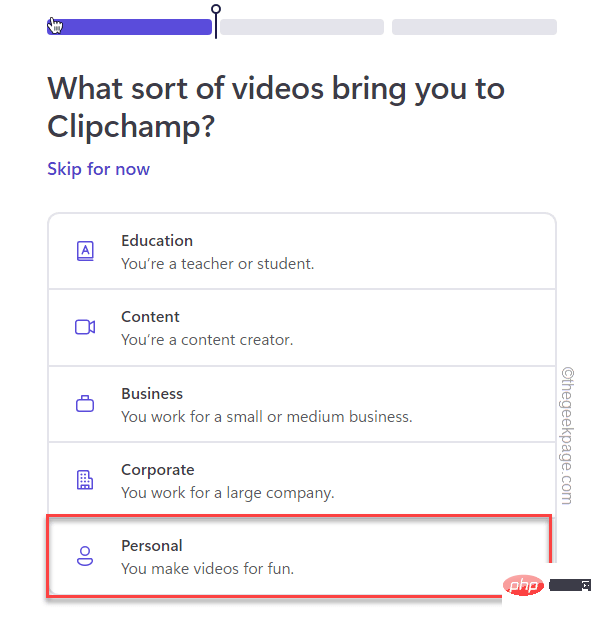
Now you can edit your video using Clipchamp.
1. In Clipchamp, click Create Video at the top of the screen.

This will open a blank screen with all the useful accessories on the left and the main video player and timeline on the right of the screen.
2. Additionally, you can switch the aspect ratio of the video. To do this, click on the small rectangular box set to " 16:9 ".
3. You can choose any option you like.
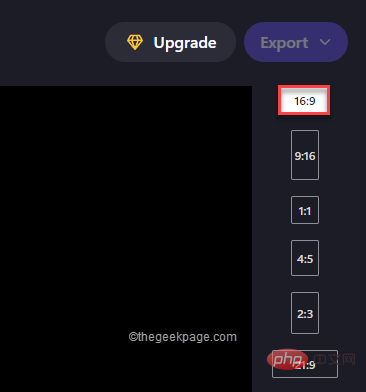
You can import video files into Clipchamp. Clipchamp allows a wide range of import options.
1. Just click on the " ⊕ " sign on the left.
2. Now you will see several places from which you can import files. You can even import files from your phone using the "From phone" option.
Also, you can drag and drop files.
3. Click "Browse File" and navigate to the video file.
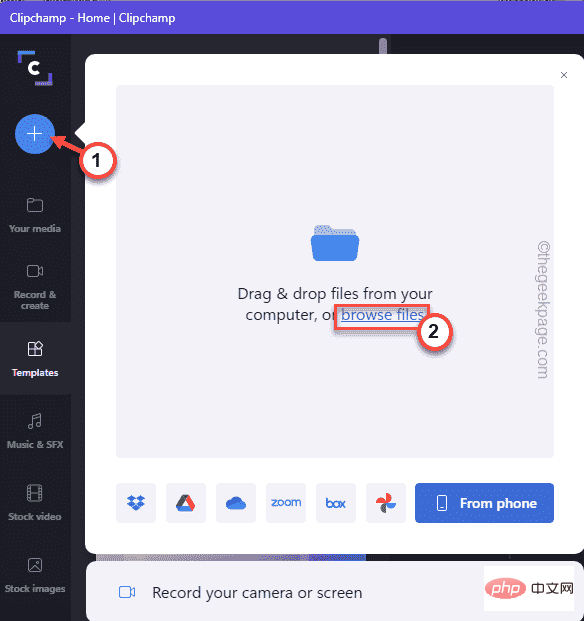
4. Simply select the file you want and click "Open".
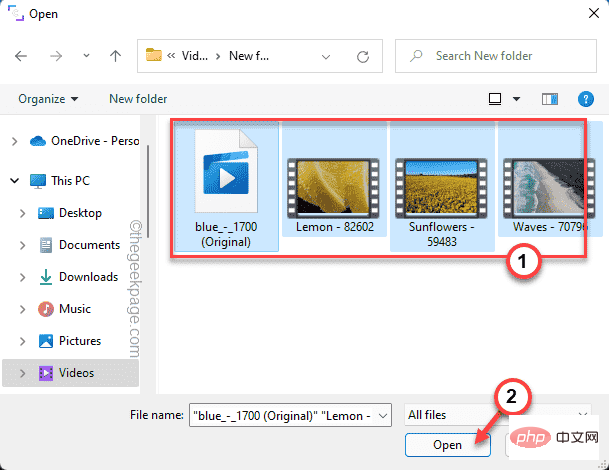
This will import your file into the Clipchamp editor.
After importing audio, video, and image files, you can add the files directly to the Timeline.
1. Just select the video file you want to start with.
2. Then, drag and drop the file onto the timeline in the lower left corner of Clipchamp.
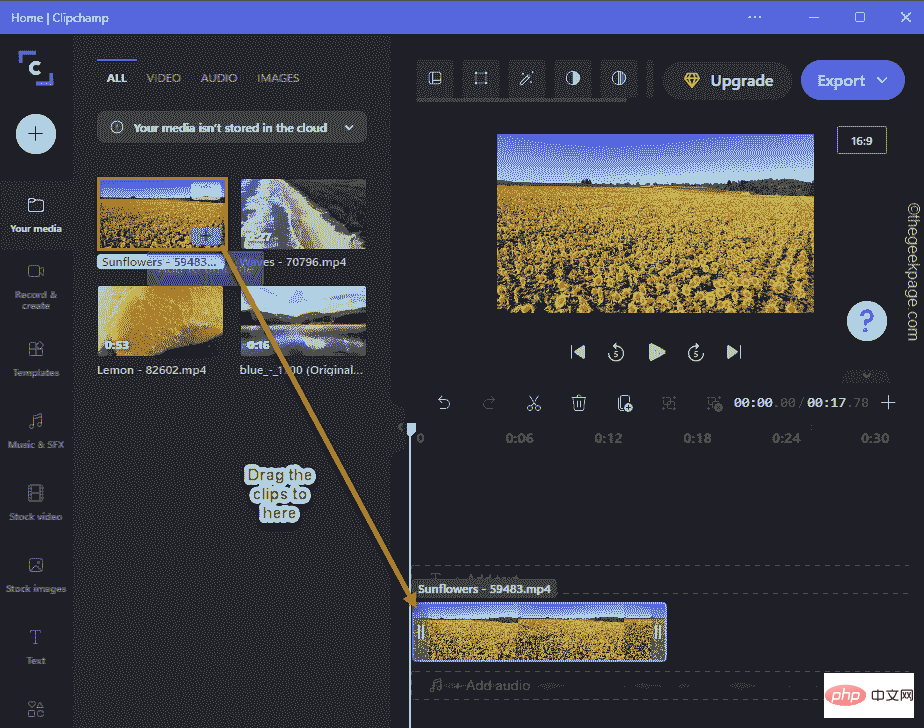
The timeline, as the name suggests, shows the order of clips that will play in the video.
You can view these clips in detail by zooming in on them. It allows you to edit your clips to the finer details you like.
3. Just click the " " button to zoom in on the timeline. Moreover, the "-" button has exactly the opposite effect, that is, shrinking the timeline.
4. Additionally, there is another key that can be used to zoom in to fit the clip in the timeline.
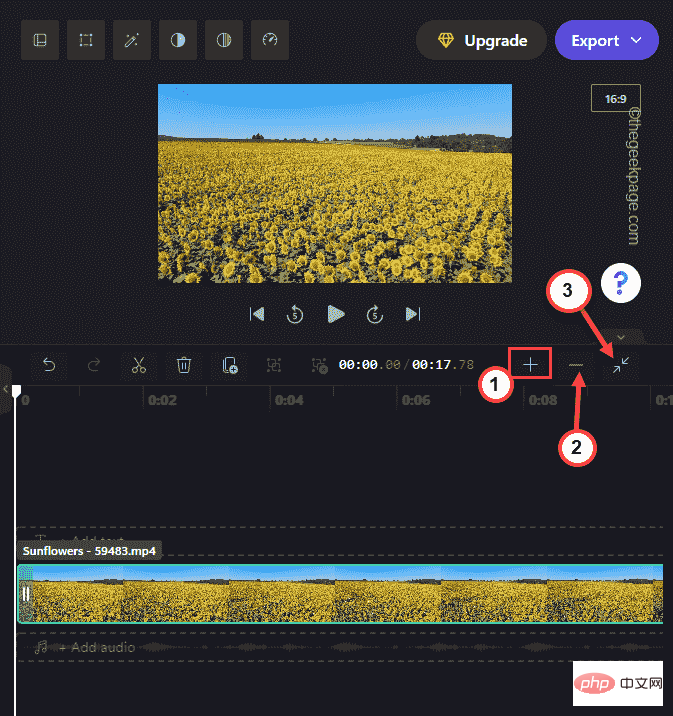
The Video Viewer section in the upper right corner shows the actual video you are making.
You can resize the video viewer screen to your liking.
1. Simply select the video clip in the viewer.
You will notice that four dots are visible in the four corners of the video. You can switch the size of the video as needed.
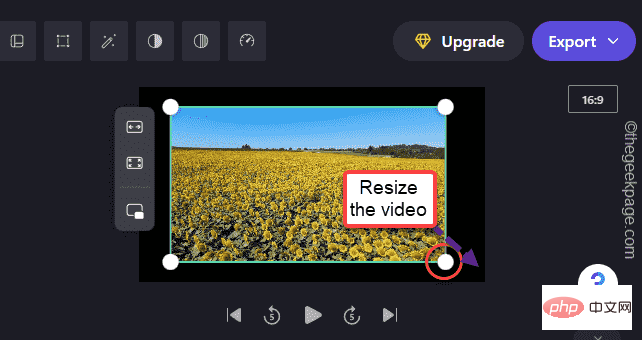
#2. Additionally, there are three different options for setting video files in the viewer feed.
适合居中裁剪以填充画中画
You can use these three options to resize the video.
This way you can dynamically adjust the screen size.
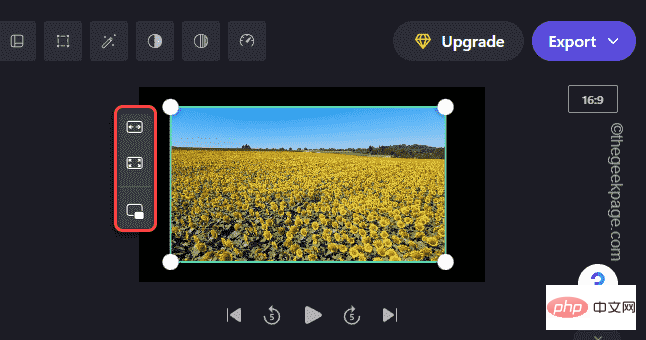
Clipchamp also includes a set of basic editing tools that you can use to trim, move, and split your original files.
Trim–
1. Simply select the video you want to trim from the timeline.
2. Then you can resize the video from both ends with your mouse.
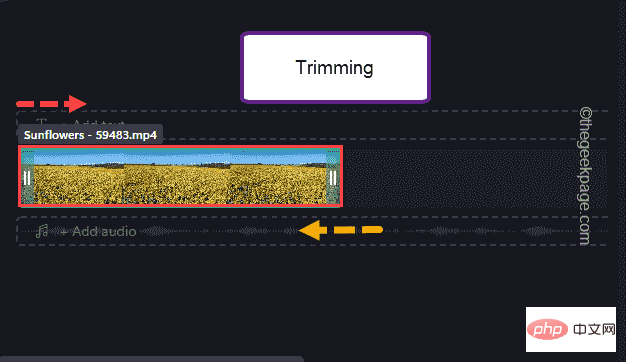
#In this way, you can trim the video clip.
Moving Clips –
You can move and adjust clips as needed.
1. Just select the clip and drag it to a specific position on the timeline.
2. Even you can select multiple clips and move them. Just hold down the Ctrl button while selecting clips, and then you can easily drag and drop them into the timeline.
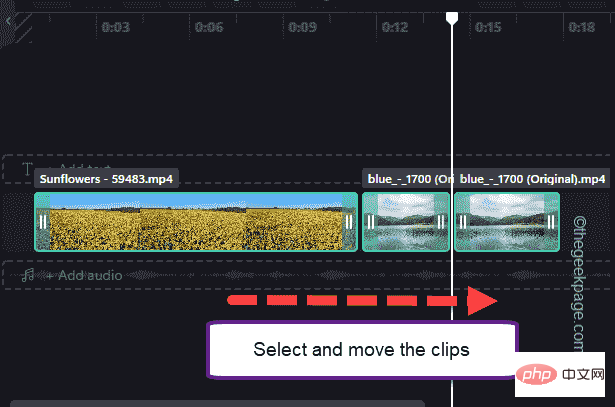
You can split a video clip into multiple clips as needed.
1. Select a clip from the timeline.
2. Adjust the slider of the clip to be divided.
2. When finished, just click the scissors icon on the tray to split the clip in half.
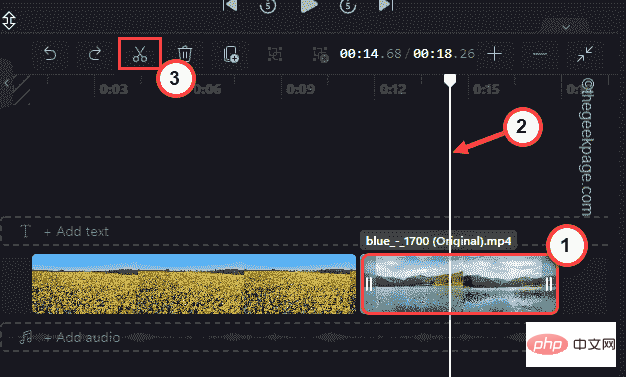 Step 7 – Other Tools
Step 7 – Other Tools
1. Select the video in the viewer area.
2. Here you will notice a few options at the top of the screen.
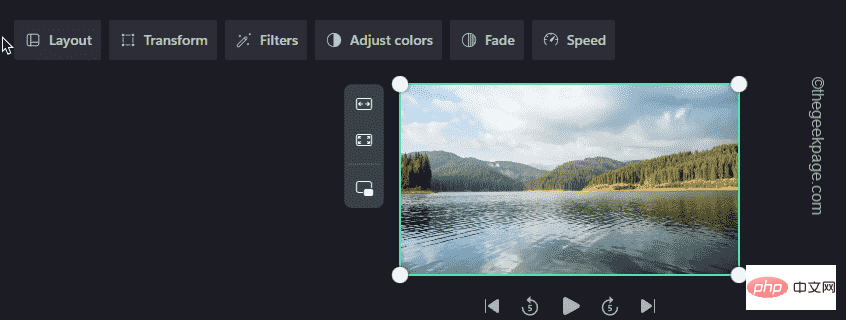 These are the various tools and their functions -
These are the various tools and their functions -
- Control the size of the clips on the screen.
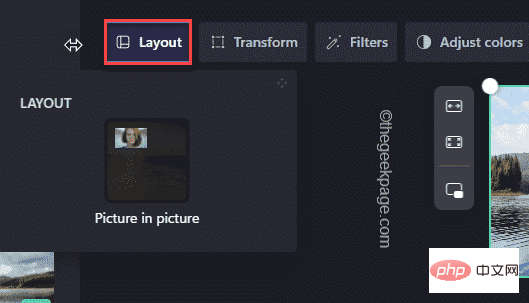
- You can crop your feed or rotate it in any direction from this menu. Also, you can control the opacity of the video clip.
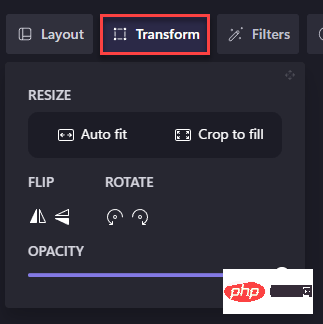
- You can apply multiple filters to a video clip. Just click on "Filter" and select any filter you like.
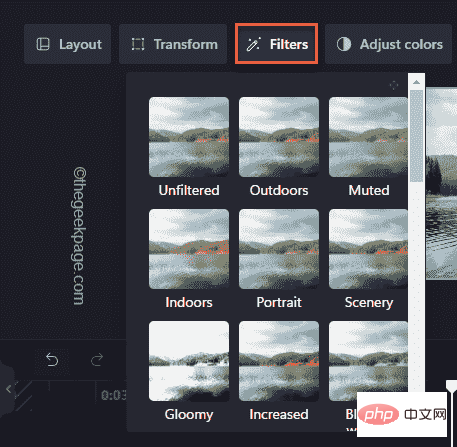
Sometimes you need color correction tools to balance the exposure, saturation of a clip , Temperature and Contrast. You can start here.
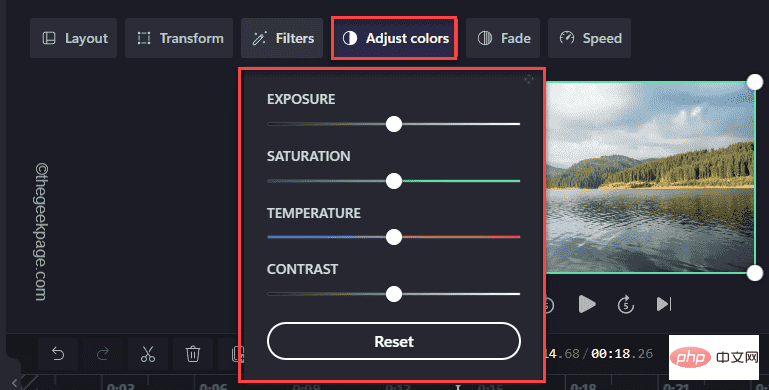
– The fade tool can be used for transitions between video clips. 1. Simply select the clip you want to fade out from the timeline.
2. Then, click "
Fade" and adjust the "FadeIn" and "FadeOut" times.
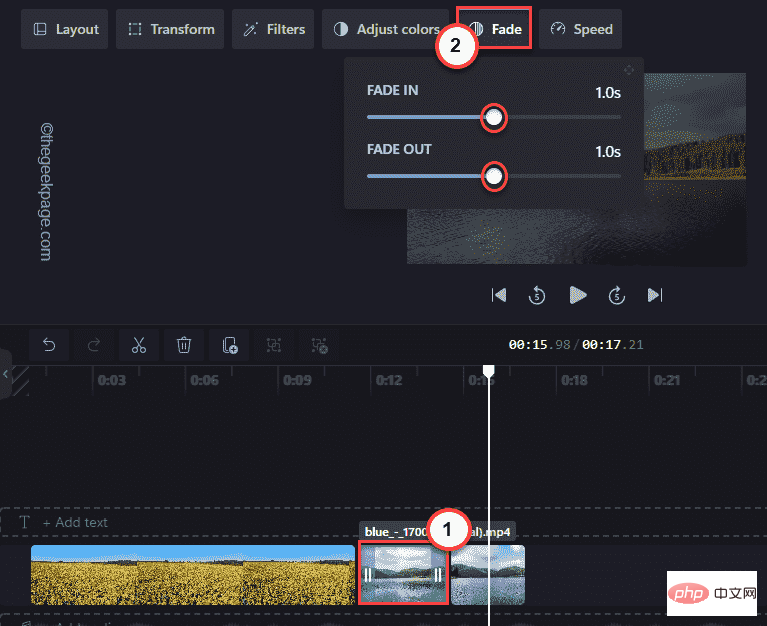 That's it! You can play the clips and notice this transition effect between clips.
That's it! You can play the clips and notice this transition effect between clips.
- You can use this option to adjust the speed of the clip.
1. Select the clip you want to change the speed of.
2. Then, click "
Speed" in the menu bar. After that, set it to "fast", "slow". 3. Adjust the speed.
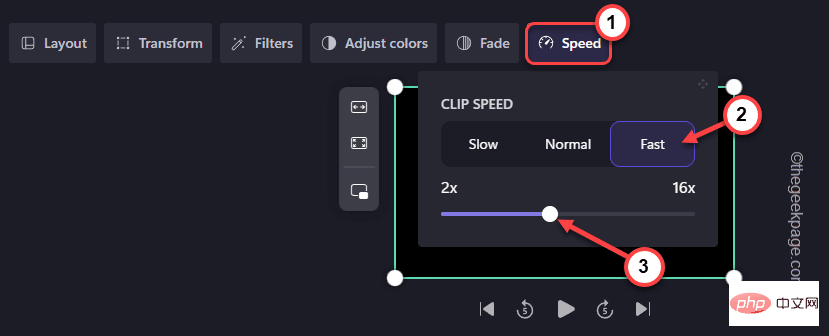 Step 8 - Text to Speech Generator
Step 8 - Text to Speech Generator
1. Select a clip from the timeline.
2. Then, click "
Record and Create" in the left pane.3. After that, click "
Text to Speech".
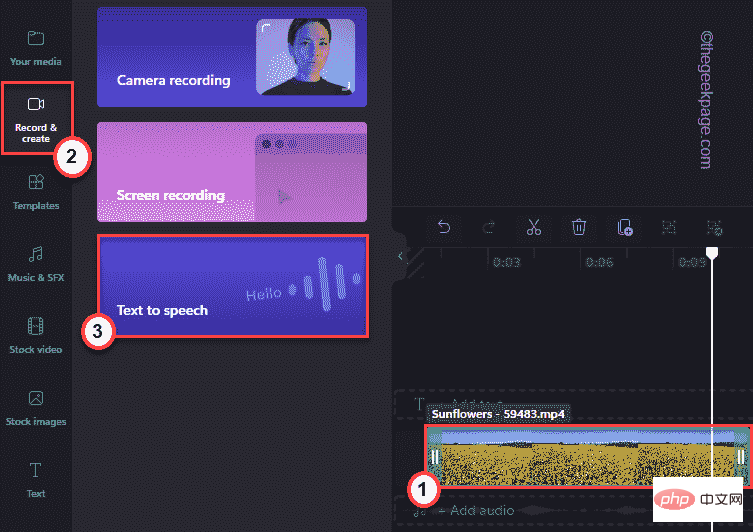 #4. Now you can select your preferred language from the Language section.
#4. Now you can select your preferred language from the Language section.
5. After that, set "Sound".
6. Next, set the "Speech Speed" to "
Normal", "Slow" or "Fast" according to your preference.
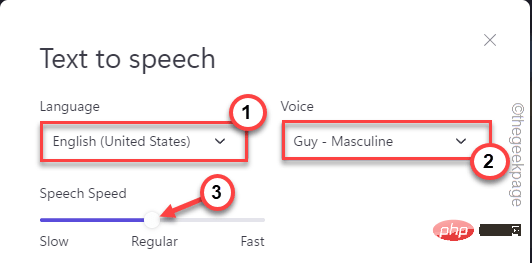 # 7. Just write your "text" in voice format in the box you want.
# 7. Just write your "text" in voice format in the box you want.
8. You can "Preview".
9. After that, click "
Save to media" to save the audio file.
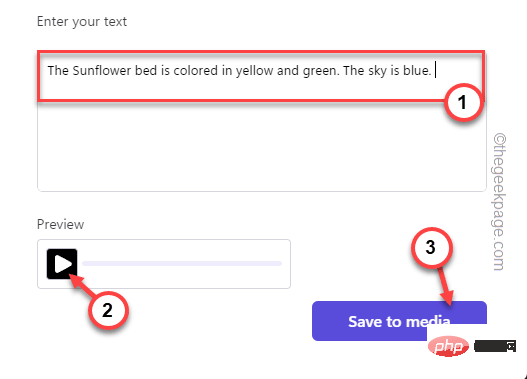 #10. On the left, you will notice that the text-to-speech audio file has appeared.
#10. On the left, you will notice that the text-to-speech audio file has appeared.
11. Move the file to the timeline to insert it into the timeline.
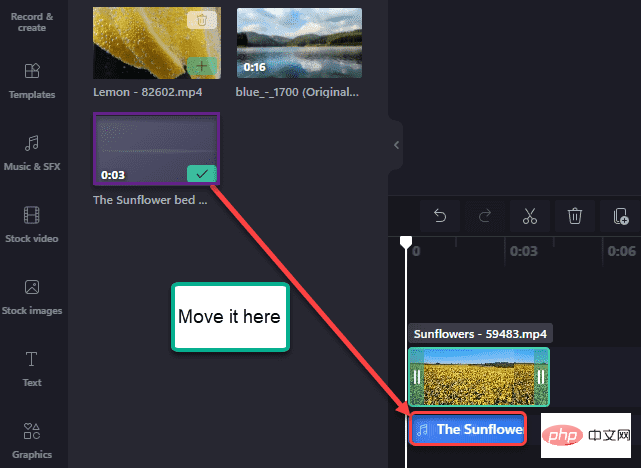 In this way, you can easily create video clips with the help of text-to-speech tool.
In this way, you can easily create video clips with the help of text-to-speech tool.
The most commonly used feature of the Clipchamp app is the built-in screen recorder.
1. In the Clipchamp app, click "Record & Create" in the left pane.
2. After that, click "Record Screen".
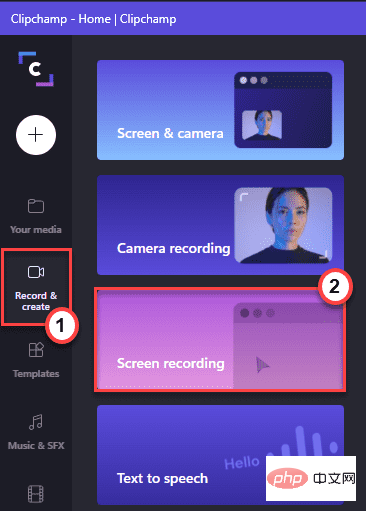
#3. You must allow this app to access the microphone and camera.
4. Just click "Allow" to continue.
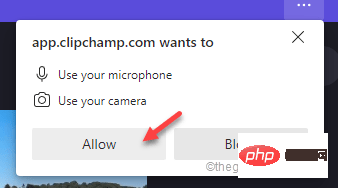
5. Now, click the red button in the corner to start recording the screen.
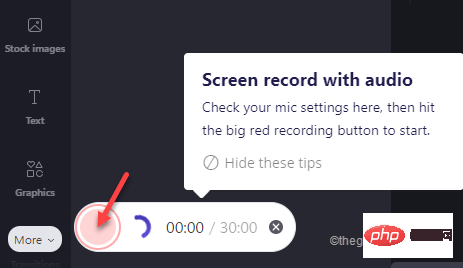
# 6. There are many options you can use to record your screen.
7. Select your window and click "Share" to start recording.
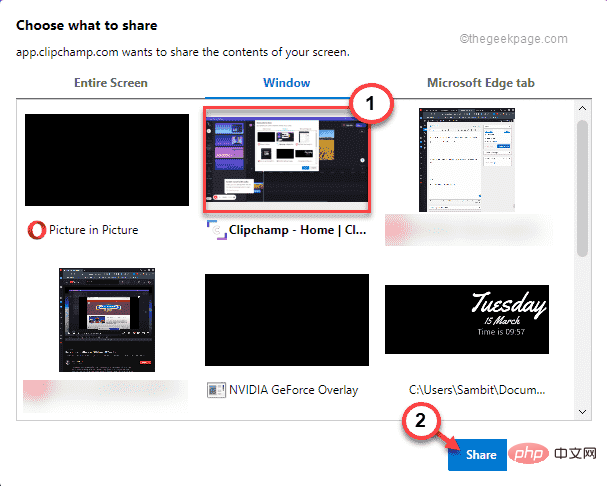
#8. After completing the screen recording, click the square symbol to end the recording.
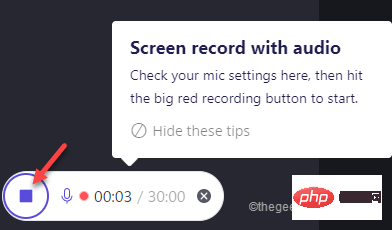
9. After recording the video, click "Save and Edit" to start editing the video.

After that, close Clipchamp and test.
You can add stock music, videos and images directly to your video clips.
1. Simply click on "Stock Videos" in the left pane.
2. You will see the stock video clip. Just select the clip and drag it directly to the timeline.
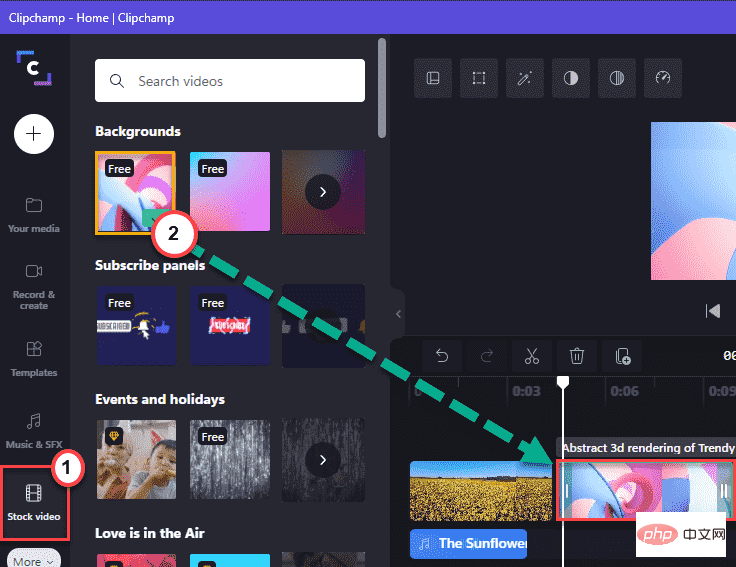
3. In the same way, click "Music & Visual Effects" in the left pane.
4. Just select your favorite music or video effect and drag it to the clip you want.
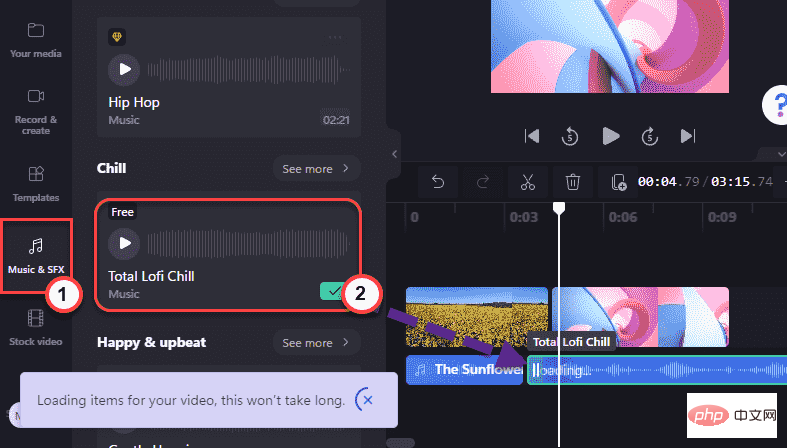
5. Now, select the audio file from the timeline.
6. Then, click "Fade Out" and switch between "Fade In" and "Fade Out" according to your preference.
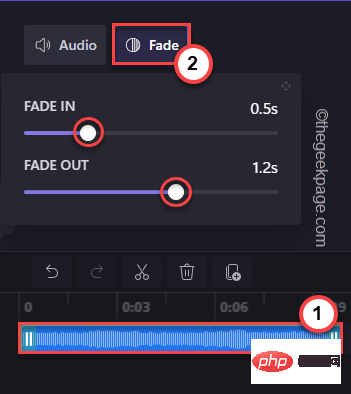
In this way, you can add videos, images and audio tracks to your video clips.
You can add text to your video if you wish.
Add text file–
1. In the left pane, click “Text”.
2. After that, select the specific text style and drag it to your preferred timeline.
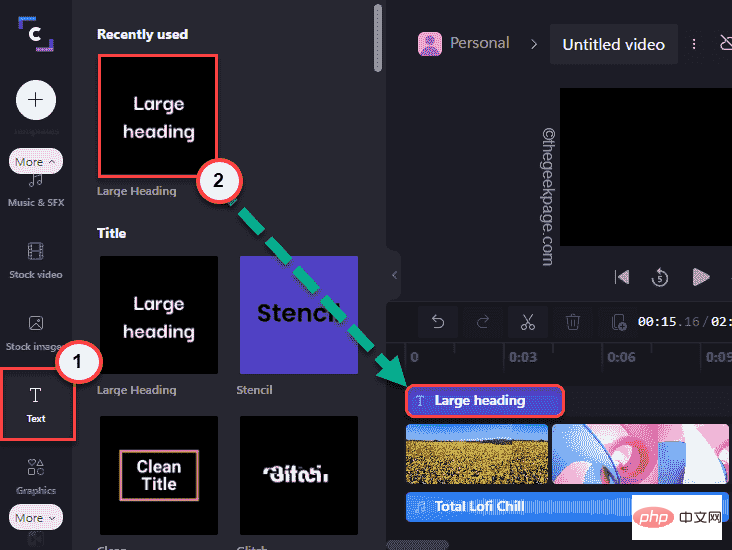
Edit text——
1. Select the text file in the timeline.
2. Then, click "Text" on the menu bar. Now, write what you want to appear in the "Text" box.
3. Additionally, you can set 'FONT' and 'ALIGNMENT' separately.
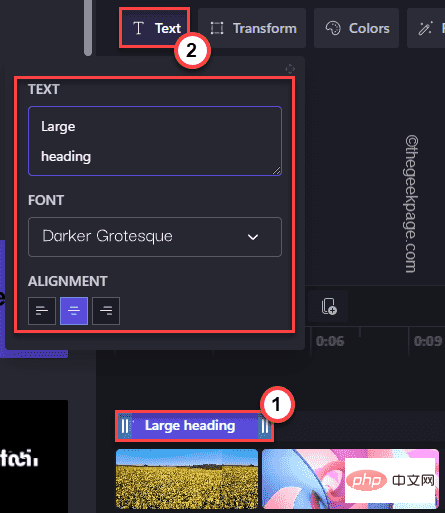
Changing Colors and Filters -
1. Select "Color" from the menu.
2. Now you can click on "Primary Color" and set the color you want.
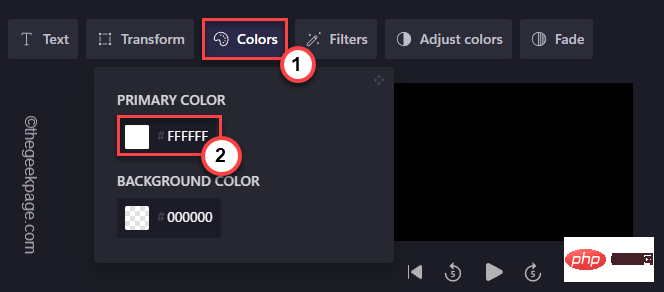
3. Also, click on "Filter" and you can select any filter from the extensive list of filters provided there.
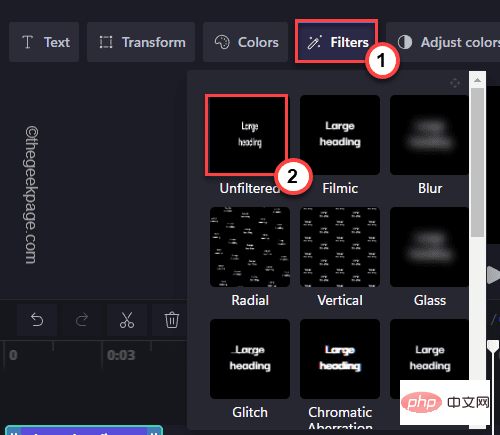
In addition, you can also use Adjust Color and Fade effects to add more details to the text.
Clipchamp provides a wide range of graphics and overlay tools for you to use.
1. Simply click on "Graphics" in the left pane.
2. Here are four different options you can use -
Background- You can use these backgrounds in your clips.
Overlays - Overlays can be used extensively.
GIPHY - Deliver short animated GIFs directly from GIPHY.
Stickers - Various types of stickers.
3. Click the arrow button in "Stickers" and then click "View more>".
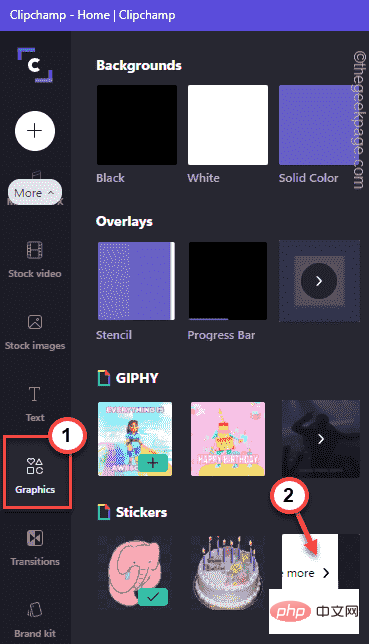
#4. Now you can search for stickers using the search box.
5. Then, drag the file to add it to the timeline.
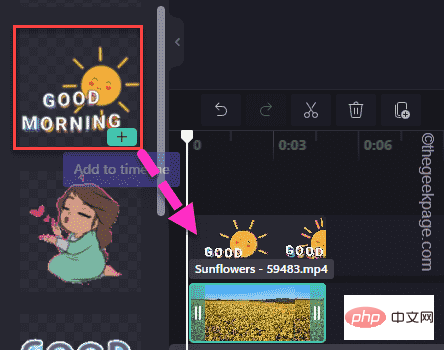
# 6. You can easily adjust the size of the stickers. Just click on it and you can resize it from the four corners.
7. In addition to this, you can also control spans directly from the timeline.
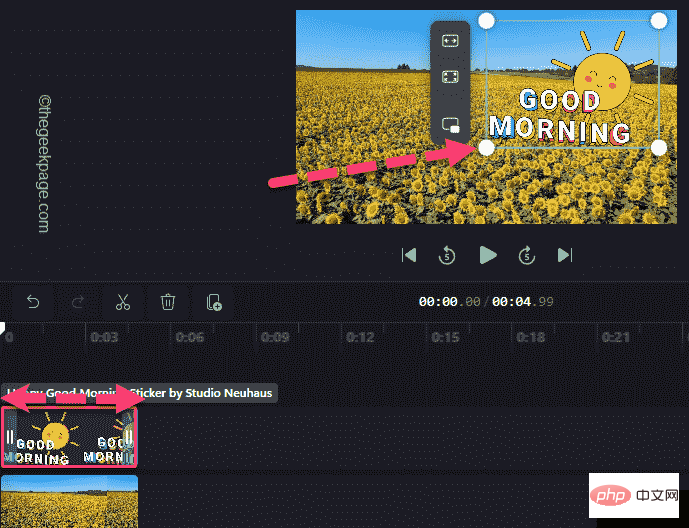
Transitions play a very important role in the video production process.
1. Go to the Conversion tab in the left pane.
2. All transformation lists should be visible here. Just select a transition from the list and drag it to the intersection of the two slides ( ).
This will create the transition.
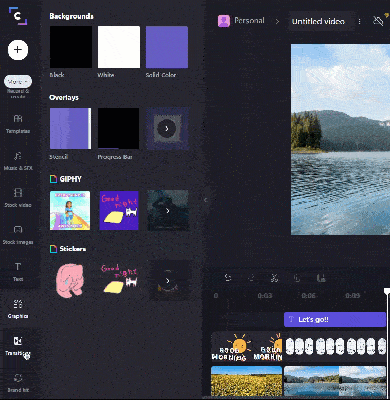
#3. You can further control the duration of the transition.
4. Select a transition from the timeline. Then, tap "Duration" and switch the time to whatever you like.
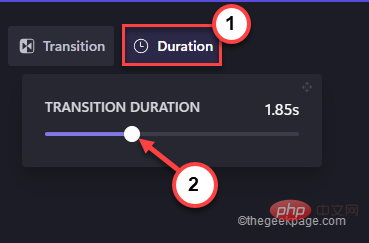
This way you can add more transitions to your video clip as needed.
Finally, it’s time to export the final video.
1. After completing video editing, click "Export".
2. Click " 480p " in the drop-down menu.
You can choose other qualities, but for this, you have to choose the premium plan. Only 480p export quality is available for free.
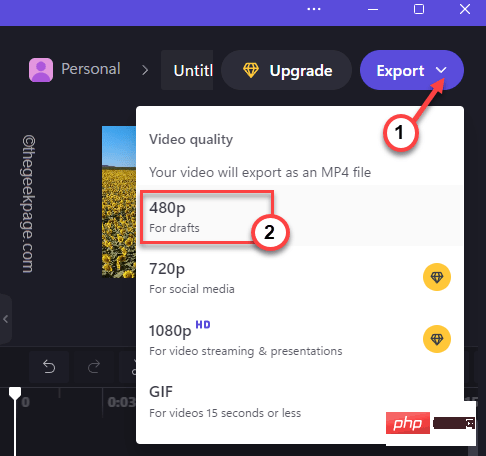
Let Clipchamp render the video.
3. Click the pen number to rename the file.
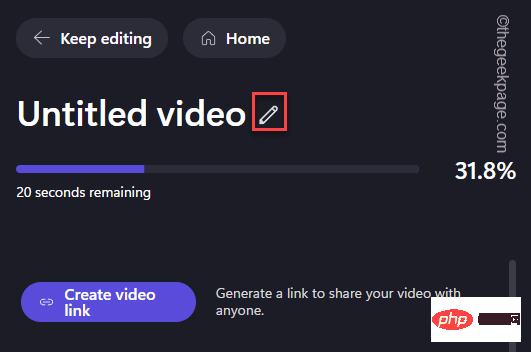
4. After completing the rendering, click "Save to computer".
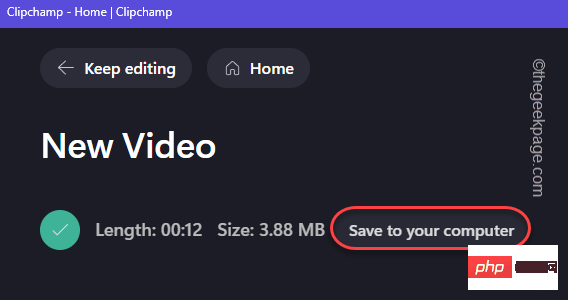
5. Now you should get the final result.
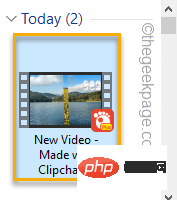
Apart from these features, there are some additional features that can come in handy.
1.Create Brand Kit
has a very useful tool that you can use to create your brand fonts, logo, colors.
But this is a premium feature and is only available in plans above Business level.
2.Ready-made templates
There are several ready-made templates that you can easily use to create quick videos for multiple topics.

This way, you can use Clipchamp and quickly edit your videos on your new Windows 11 device.
The above is the detailed content of How to use ClipChamp: the free Windows 11 video editor. For more information, please follow other related articles on the PHP Chinese website!